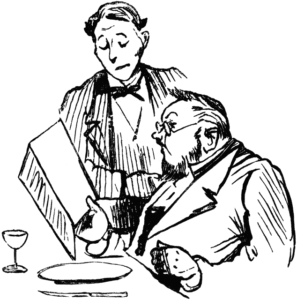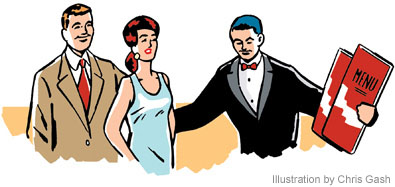It’s not uncommon for people who have worked in restaurants to talk about it with the same sense of maudlin nostalgia of an ex-con reminiscing about jail time. “How many years you been doin’ it?” a waiter might ask his colleague in the service station. “Almost ten years.” Industry people always preface the actual number of years they’ve worked in the business with “almost”—exhibiting the same blind faith a criminal would show toward the possibility of parole.
 But for those of us who support ourselves with restaurant work—through the pain of incarceration—we learn invaluable life lessons that stay with us forever. People say “If you can work in restaurants, you can work anywhere” with good reason. It’s true. You get treated like a dog sometimes in this industry—let’s be honest—but once you’ve endured it, you can handle any work environment.
But for those of us who support ourselves with restaurant work—through the pain of incarceration—we learn invaluable life lessons that stay with us forever. People say “If you can work in restaurants, you can work anywhere” with good reason. It’s true. You get treated like a dog sometimes in this industry—let’s be honest—but once you’ve endured it, you can handle any work environment.Here are five of the most important lessons we’ve learned working in restaurants that define us professionally and will, no doubt, help to shape our future careers:
Service industry jobs are the ultimate test of your mettle. Whether it’s screaming babies throwing silverware, cranky people sharing appetizers, or verbal tips, a night won’t go by without someone pushing your buttons. To survive in the business, you can’t take it personally. One waiter, after hearing of a customer’s complaint, decided to confront them. “Was everything ok with your dinner tonight?” he asked wryly. “Yes, it was fine.” they answered, not looking for a fight. “Really? Because that’s not what I heard…” The next day he was fired. It’s too easy to take the bait every time someone gets upset, but you learn that it’s not worth it. You’re better off killing them with kindness because you can’t win an argument with a customer who’s convinced he’s always right.
You think it should be easy for the waiter to bring you that side of ranch dressing you need. And you’re right… it should be. Except for the fact that he has a round of cocktails waiting at the bar for the table behind you, a two-top that just sat down who needs water, and a bus tub overflowing with dirty plates that has to be taken back to the dishwasher. Staying organized is integral to any restaurant running smoothly, BOH and FOH alike, and multi-tasking is imperative. There is little margin for error so you must find a way to prioritize your steps and fight through the weeds. These skills are applicable to any career, especially those that place a premium on delivering a better customer experience.
Working in restaurants, you are an ambassador of the dining experience. As such, you must learn to confidently present yourself to strangers. Even if you have to wear some silly uniform or pieces of flair, you are part of the product. Knowledgeable waiters who confidently answer questions earn their table’s trust. Once they have trust—even when something goes wrong—the guest is more forgiving. With experience, we learn how to tailor our service to each individual, deciphering their needs and altering our routine to suit different circumstances.
Guests can behave irrationally when a restaurant falls short of their expectations. Experienced waitpersons use their arsenal of wit and charisma to disarm the guest’s anxiety but, without exercising patience, tensions can bubble over. Restaurant kitchens are pressure cookers, too, with a lot of moving parts. The slightest misstep can create mid-flight turbulence. But, like a pilot flying through a hailstorm, you must stay calm. Yesterday’s drama is easily forgotten. The chef tore you a new one after the shift because you ordered the wrong side dish? Today, you’re joking around about it. One of your tables asked to speak with a manager last night to complain about you? Tonight, someone else left a comment card praising your attentive service. Once the shift is over, no matter how awful it was, tomorrow is another day. Most of the time—even when the walls are crumbling backstage—the guest will never notice anyone breaking a sweat. Now that’s great service!




